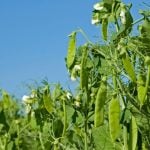The Pulse Variety Hub is a new digital platform from the Saskatchewan Pulse Growers to help producers select the best varieties for their specific growing conditions.
Tag Archives faba beans

Lower nitrogen rates in dry beans could pay off for farmers
Manitoba trials test whether farmers can apply less nitrogen to dry beans without losing yield, despite their typically poor nitrogen-fixing capacity
Manitoba research is testing whether reduced nitrogen fertilizer in dry beans can maintain yields while cutting costs and lowering greenhouse gas emissions.

Weigum’s work with Alect Seeds earns her Alberta’s Outstanding Young Farmer award
Sarah Weighum specializes in pedigreed seed production and retail sales in a business she owns with her parents
Three Hills farmer earns Alberta’s Outstanding Young Farmers award through marketing of Alect Seeds to bring the best varieties and crop types to their customers and improve the quality of the land they farm.

Frost-damaged fababeans may make suitable hog feed
Results of a Canadian research project show that pork producers may have a new, safe and low-cost feed source. Researchers with the University of Alberta, as well as the University Autónoma de Baja California and Mexicali, México, set out to establish the benefits of frost-damaged fababeans in pig diets. They found that feeding frost-damaged fababeans […] Read more

Faba bean research means high protein, less gas
UPDATED – March 25, 2024 – 0825 CST – Glacier FarmMedia – Let’s get the obvious part out of the way. By separating “the good stuff” (protein, starch and dietary fibre) from faba beans, a University of Alberta researcher has improved on a process that minimizes human flatulence from eating them. That issue has long […] Read more




